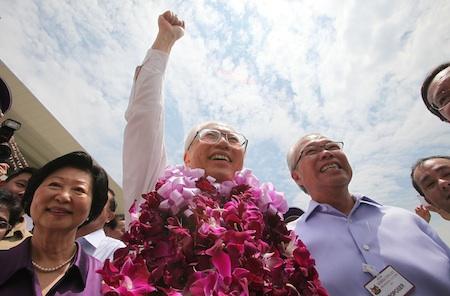Singapore’s new president wins by a hair
Singapore’s newly elected president, Tony Tan, raises a fist on the campaign trail.
The wealthy island of Singapore has elected a new president, Tony Tan, selected from three other candidates who share the same last name. (It's a common last name in Singapore, where most of the population is ethnically Chinese.)
Politics are typically dull in Singapore, where rallies and discourse are limited by a restrictive government. And the presidency is a largely ceremonial position that offers far less power than the premiership.
What's interesting is that the new president, an establishment favorite, won by only 0.3 percent. That he very nearly lost the race suggests that Singaporeans aren't perfectly satisfied with the political dynasty that has led the country since its inception in 1959.
The current prime minister is the son of Lee Kuan Yew, the nation's first premier and its guiding force for many decades. Singaporean politics are bland because it's a one party show that has historically kept opposition to a minimum.
Conventional wisdom says that most Singaporeans are pleased with the no-nonsense guys who took the former British colony's reins four decades ago.
But the recent election of a handful of politicians outside the ruling party, and their favored candidate's extremely narrow presidential victory, shows a sizable number of Singaporeans aren't satisfied by the Lee dynasty.
How are Singaporeans coalescing all that dissent in such a tightly controlled society?
Why, Facebook, of course.
We want to hear your feedback so we can keep improving our website, theworld.org. Please fill out this quick survey and let us know your thoughts (your answers will be anonymous). Thanks for your time!
